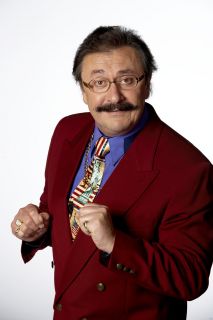French territories
If there's a part of France that is the closest to Belgian culture, it's the Nord department (Lille, Dunkirk, Douai...). It mainly shares with Belgium the tradition of the friterie, friture or frietkot, which is a place, often a sort of van, where someone distributes fries in boxes or paper cones. It is the only place in France where fries are a real tradition, but I insist, "French" fries are mostly Belgian!... Anyway, Nord was made famous in 2008 with the French blockbuster Bienvenue chez les Ch'tis, which featured local comedian Danny Boon speaking a Picard dialect called Ch'ti(mi). As a matter of fact, similar dialects are spoken in the Belgian area of Mons and Tournai!Yet, Picard is not the only local language in Nord! Once upon a time, West Flemish was the main language in Maritime Flanders (coastal part of Nord), an area that includes Dunkerque, and, strangely enough, the village where the film took place (an error which a lot have criticised after it was released). This area was part of the ancient County of Flanders, which also included cities such as Lille or Douai. Actually the later cities are in another area called, this is not a joke, Walloon Flanders, and yet now part of France! Both areas became French after the Treaties of Nijmegen in 1678-9 and West Flemish is now only known to very few people.
In the same department, we find cities including Valenciennes, Maubeuge or Le Quesnoy, which are part of what could be called French Hainaut, and were included in the County of Hainaut. Later on, French king Louis 14th conquered them in 1659-78, so that they became French, while the Northern part of the former county became later on the Belgian province of Hainaut.
Borders of French Flanders before 1789
Another part of France which is very close to Belgium and, especially Wallonia, is the city of Givet in the French department of Ardennes. It is, as far as I know, the only place in France where Walloon was/is spoken, which makes it... a "French Wallonia"! Givet used to belong to the Liège bishops in the Middle Ages, but much later on it was given to Louis 14th also after the Treaties of Nijmegen.
Dutch territories
The neighbouring Netherlands, with which Belgium used to form a bigger country, has nowadays two provinces that could be considered as sisters to Belgian provinces: Limburg and North Brabant.The Belgian province of Limburg is the Western part of a former Limburg, from which an Eastern part was given up for the Netherlands in 1839, and which belonged in great part to the Principalty of Liège and the dukes of Brabant. The current Dutch province of Limburg actually comprises only a small part of the former Limburg, mostly the area of Maastricht. Ultimately, Gelder was part of Limburg as well and it even came to be included in the United Belgian States, but it came back later on to the Netherlands.
In a recent blog post I talked about the possible name change for the province of Antwerp to "Central Brabant" (Midden-Brabant) to favour its Brabantian past. In the Netherlands, the North Brabant also used to be part of the Duchy of Brabant, but it was given to the Netherlands after the Peace of Westphalia in 1648. According to the politicians that want the name change of the province of Antwerp, the two territories still have a lot of cultural exchanges nowadays, in addition to similar dialects.
And Luxembourg
As a matter of fact, the Grand Duchy of Luxembourg was officially Belgian from 1830 to 1839! Then the Southern part made a country on its own and the Northern one remained Belgian, becoming the province of Luxembourg. Nevertheless, Luxembourg is still very close to Belgium, not only because both are small countries with three official languages. A lot of Belgians, especially those from the Belgian province of Luxembourg, (try to) find a job in the Grand Duchy. Another element was the currency, now replaced with the euro: the Luxembourgish franc had an equivalent value to the Belgian franc, so that nobody really cared about their difference, a bit like Scottish pounds and English pounds (except that it seems to be problematic to use Scottish pounds in London...). Finally, the main private television channel in Belgium, RTL-TVI, was primarily a Luxembourgish channel. And currently, it is still possible to watch a news broadcast in Luxembourgish language at 6am every day on Club RTL... I don't really know why, to be honest!In a future blog post, I will also talk about Belgian settlers in the USA, who founded cities such Namur, Brussels or Belgium in Wisconsin, so keep posted!














